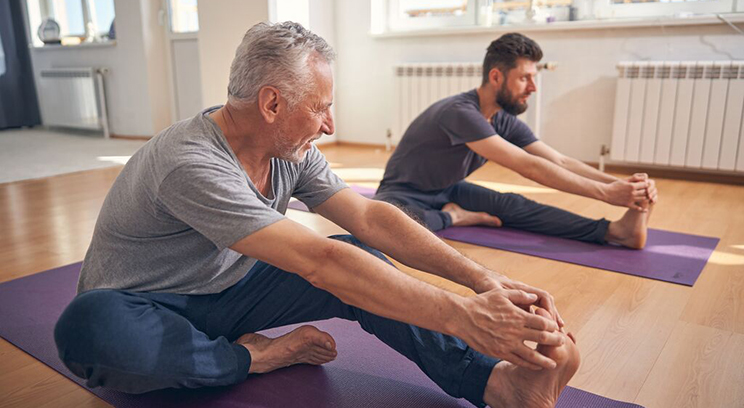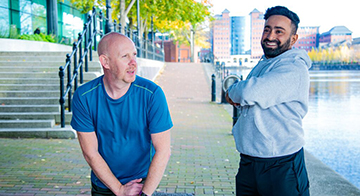What is average life expectancy around the world?
How to live well for longer is a topic at the forefront of our minds right now. Globally, average life expectancy from birth is now at 73.16 years, according to current data from The United Nations Populati on Fund1, with countries including San Marino, Monaco, Hong Kong, Japan, and Norway living the amongst longest, according to the research company Statista2.
“All societies are growing older – we’ve never had so many over seventy-year-olds alive – and so we’re naturally fascinated by longevity,” says Dr Richard Siow, Director, Ageing Research at King's (ARK), King's College London.
“The key is to “focus on promoting a wellness agenda before you get ill. That way you can remain healthy well into your eighties, and even living with certain age-related conditions, but still live a healthy and fulfilling life.”
- Dr Richard Siow
Different countries have different resources, lifestyle approaches and healthcare systems, which makes for dramatically different longevity outcomes. “But it’s not just about living longer, it’s about maintaining wellness throughout our lives to extend our health-span,” Dr Siow adds.
He says there isn’t one single factor that leads to a longer life; it is a complex set of components. “We would all like to have that magic bullet, but the truth is that longevity is influenced by genetics, as well as lifestyle factors like diet or how much air pollution we’re exposed to, as well as healthcare and policy in individual cultures and countries.”
But there are some wellness practices we can adopt from the countries with the longest average life expectancy. As Dr Siow says, the key is to “focus on promoting a wellness agenda before you get ill. That way you can remain healthy well into your eighties, and even living with certain age-related conditions, but still live a healthy and fulfilling life.”
The role of diet in life expectancy
Studies show that eating a Mediterranean diet of whole grains, fruits, vegetables, seafood, beans, and nuts, is consistent with reduced cases of brain disease, cancer, and diabetes.
The diet of a nation plays a large part in its longevity. The residents of the tiny country of San Marino, which nestles on the edge of the Italian border, enjoy a Mediterranean diet, which includes healthy foods like whole grains, fruits, vegetables, seafood, beans, and nuts. Multiple studies, including a comprehensive overview published in the Journal of Internal Medicine in 2021, found that those who followed this way of eating experienced less brain disease, cancer, and diagnosis of diabetes3.
“The upside of this diet is in the balanced benefits you get from the range of foods it contains, a focus on fresh and minimally processed foods, and that it contains more of the healthy fats than the unhealthy ones,” Dr Robin Clark, Medical Director for Bupa Global & UK says. He adds that it is something anyone can adopt. “It is achievable by anyone shopping sensibly, not just by those living in the Mediterranean region.”
Similarly, those in the so-called Blue Zones regions of Japan, who consistently score highly in longevity studies, traditionally eat a 95% plant-based diet that's rich in legumes, whole grains, vegetables, and nuts along with fish. “Eating fish is widely regarded as an important source of nutrients (healthy fats, vitamins, and minerals) and is a low-fat source of healthy protein,” Dr Robin says. “The usual recommendation is to try and eat fish once to twice a week.”
Dr Siow adds “in addition to the diet, there are lots of other factors from the Mediterranean lifestyle that we should also look at, such as sleep patterns, exposure to more sunlight and how active they are".
How society can affect population longevity
15.2%
Those with the strongest sense of purpose lowered their risk of death by 15.2%
Countries including Japan and Norway place a huge social importance on community, something that has been proven to increase longevity4. “Social interaction and community are an important part of life and those people who have strong and regular contacts with these networks are more likely to have greater wellbeing, resilience, physical and mental health than those who are socially isolated,” Dr Robin says.
In addition, a strong sense of purpose – often linked with a sense of community – is common in those who live for longer, according to a recent study published in the journal Preventative Medicine. Those with the strongest sense of purpose lowered their risk of death by 15.2% compared to people with the least sense of purpose – something that was experienced across race and ethnicity, but the effect of having a purpose on one’s life expectancy was more pronounced for women5.
Life expectancy is influenced by our environment
The air we breathe is a hugely important factor that helps increase life expectancy. Both Japan and Norway enjoy good air quality. In Norway, the level of atmospheric PM2.5 – tiny air pollutant particles small enough to enter and cause damage to the lungs – is 6.7 micrograms per cubic meter, below the OECD average of 14 micrograms per cubic meter6. Similarly, in Japan PM2.5 is lower than the OECD average7.
Dr Siow says that his team’s studies widen that out to everything we are exposed to, “from air pollution, yes, but also to the amount of time we spend on our mobile phones and computer screens, our work environment – it all impacts our long-term physical and mental health” – and as individuals we do have choices.
Legislation and longevity
As well as factors that may increase life expectancy on an individual level, what a country does from the top down can hugely influence its population’s longevity outcome. Hong Kong, for example, now has the lowest cardiovascular mortality and one of the lowest cancer mortalities in women amongst high-income populations, thanks in part to a smoking ban, according to a study in the Lancet8.
“Public policy can make a big difference,” Dr Siow agrees. He adds that it can be a challenge educating the policy makers, “but if we can, and they understand, it has a huge effect. It could be used in a more targeted way, too. For instance, those pockets of areas within a country where we see lower life expectancy, we could support those who need more help across the life course, from childhood to old age".
Take advantage of health checks
In the face of fads or quick fixes that promise to promote longevity, Dr Robin encourages caution: “Health and wellbeing are usually about playing the long game, identifying what the healthy habits are that work for you and integrating these to be a permanent feature of your lifestyle. Prioritising and having a health check is a great way to establish your current state of health and to help plan your goals going forward. This is a better way to address your own health, for you to be in control, and to have a regular check-in point to assess your progress against success.”




